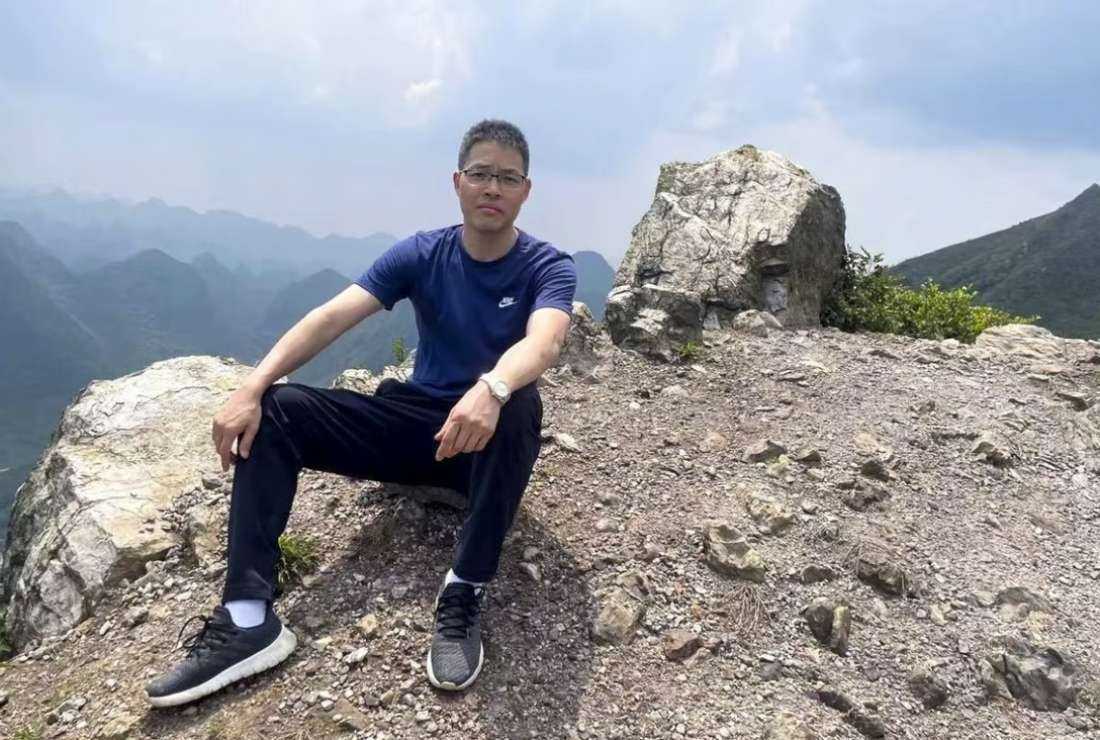
Wang Aizhong gets 3 years after being found guilty of 'picking quarrels and stirring up trouble'

Wang Aizhong a political dissident based in Guangzhou of China, has been sentenced to three years in jail for social media postings. (Photo: Handout via 'South China Morning Post')
A court in China’s Guangzhou city handed down a three-year jail term to a pro-democracy activist for posting foreign media reports on social media platforms.
The Tianhe District People's Court found Wang Aizhong guilty of "picking quarrels and stirring up trouble," among other charges on May 18, Radio Free Asia (RFA) reported.
The court accepted the prosecution's argument that Wang had "used social media platforms to quote and re-post false reports in the foreign media about China's political system."
Wang’s wife, Wang Henan, 46, fiercely criticized the judgment, calling the trial and sentence a “joke.”
"It's an absolute joke, and we totally refuse to accept it," she said adding that her husband’s lawyers have argued all along that Wang "is innocent because nothing that he said added up to a crime."
Wang was detained on May 28, 2021, and placed under house arrest at his home in Guangzhou. The police raided his apartment and confiscated reading materials and electronic devices.
"It's a way of keeping me quiet"
His wife told RFA that the police had escorted her to the court on the day of the sentencing and added that she was prevented from attending the pretrial conference with her husband and his defense team.
"They don't want me to know too much about the process and content of the trial," she said adding that "It's a way of keeping me quiet and stopping me from posting something publicly."
The courtroom and the surrounding areas were cordoned off with a heavy police presence.
"There are plainclothes police officers dotted along more than one kilometer from the court gates, all the way to the subway entrance," said an unnamed Guangzhou resident, RFA reported.
"One of them asked to see my ID ... then I was told to leave immediately, or I would be taken to the police station," the resident further added.
Wang played a key role in establishing the Southern Street Movement in Guangzhou which called for the abolition of one-party rule in China and demanded greater political freedom and transparency related to public officials’ wealth.
The movement dissolved in 2014 after a crackdown by the communist regime that saw most members either jailed or placed under surveillance.
However, Wang continued his activism and his sharing of tweets from foreign media related to China on local social media sites irked the authorities. He shared the posts with his comments on socio-political issues in China.
"We as citizens have the right to question them"
Liang Yiming, a rights activist, pointed out that Wang’s comments on social media have always been very moderate, and that he had only been exercising his constitutional right to freedom of speech.
"Take the pandemic in Wuhan. Wang Aizhong once called on them to disclose the number of deaths, but the authorities felt that this would cause panic," Liang said.
"They don't like people to be so proactive, but we as citizens have the right to question them, or why would we pay our taxes and fund a government that just does whatever it wants," he added.
In a 2018 interview with ABC News, Wang alleged that his Twitter account was hacked and thousands of tweets and content that he had posted on the micro-blogging site had vanished.
"All of the tweets that I posted disappeared, and more than 1,000 users I followed on Twitter disappeared as well," he said.
Wang was also a key activist during the 2013 Guangzhou protests after the Southern Weekend newspaper was forced to change its New Year editorial calling for political reform in China into a tribute praising the ruling Chinese Communist Party.
Activists, journalists, and academics faced off with the authorities for several days over the issue.
The Guangzhou protest was one of the first calls by the Chinese public for political freedom since the communist regime crushed a pro-democracy rally in Beijing’s Tiananmen Square in a brutal military crackdown in 1989.
Help us keep UCA News independent
The Church in Asia needs objective and independent journalism to speak the truth about the Church and the state.
With a network of professionally qualified journalists and editors across Asia, UCA News is just about meeting that need. But professionalism does not come cheap. We depend on you, our readers, to help maintain our independence and seek that truth.
A small donation of US$2 a month would make a big difference in our quest to achieve our goal.

Share your comments